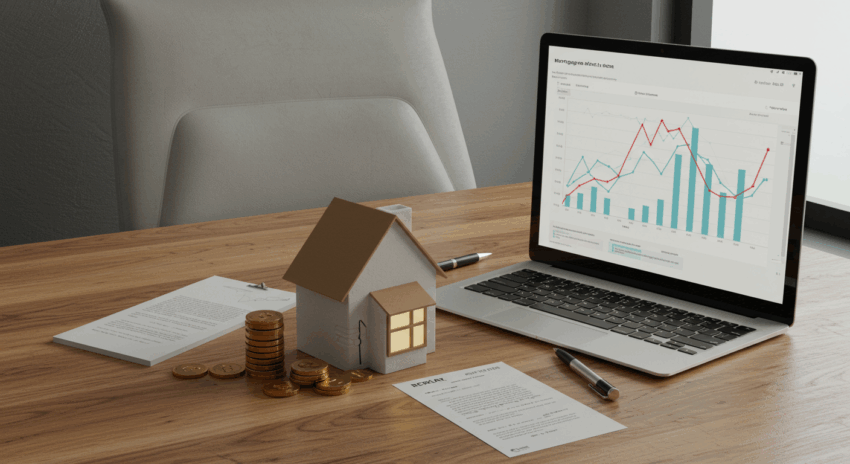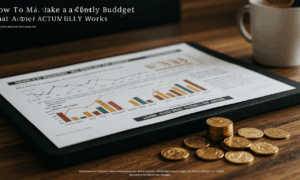Mortgage Alert: How the Interest Rate Hike Affects You (And What to Do About It)
A recent interest rate hike has sent ripples through the economy, and if you are a homeowner or aspiring to be one, this news directly concerns you. The cost of borrowing money is on the rise, and your mortgage, often the largest financial commitment you will make, is at the forefront of this change. Understanding what this means for your wallet is not just smart; it is essential for maintaining your financial stability. This article will break down exactly how rising rates impact your mortgage and provide you with clear, actionable strategies to navigate this new financial landscape.
Whether you have a fixed or variable-rate mortgage, or are currently house-hunting, this shift in monetary policy has implications for you. We will explore the mechanics behind these changes and equip you with the knowledge to make informed decisions, protect your finances, and stay ahead of the curve.
Understanding Why Interest Rates Go Up
Before diving into the solutions, it is crucial to understand why this is happening. Central banks around the world raise their benchmark interest rates primarily to combat inflation. When inflation is high, the cost of goods and services is rising too quickly, eroding your purchasing power. By making borrowing more expensive, a central bank aims to cool down spending in the economy, which helps bring inflation back under control. This is a standard tool of monetary policy.
While this is a macroeconomic strategy, its effects are felt at a very personal level. When the central bank raises its rate, commercial banks and lenders follow suit, increasing the interest rates on various financial products, including credit cards, personal loans, and, most significantly, mortgages. This directly increases the cost of borrowing for consumers.

The Direct Impact: Variable-Rate vs. Fixed-Rate Mortgages
How an interest rate hike affects you depends entirely on the type of mortgage you have. The distinction is critical.
- If you have a fixed-rate mortgage: You can breathe a sigh of relief, at least for now. Your interest rate and monthly payment are locked in for the duration of your term. You are shielded from immediate market fluctuations. However, this hike will become relevant when your term is up for renewal. At that point, you will have to renew at the prevailing market rates, which will likely be higher.
- If you have a variable-rate mortgage (also known as an adjustable-rate mortgage or ARM): You will feel the impact almost immediately. These mortgages are tied to the lender’s prime rate, which moves in tandem with the central bank’s rate. When the prime rate goes up, the interest rate on your mortgage increases, leading to a higher monthly payment. Even a small percentage increase can translate into a significant additional cost over the course of a year.
Actionable Steps for Variable-Rate Mortgage Holders
If you have a variable-rate mortgage, passivity is not an option. It is time to be proactive to mitigate the financial pressure. Here are several steps you can take:
- Recalculate Your Budget Immediately: Your first step is to understand the new reality. Contact your lender or use an online mortgage calculator to determine your new monthly payment. Then, review your household budget to see where you can adjust your spending to accommodate this increase. This might be a good time to review your overall savings strategy.
- Consider Converting to a Fixed-Rate Mortgage: Explore the option of refinancing your variable-rate mortgage into a fixed-rate mortgage. This will give you the stability and predictability of a set payment for the entire term. While fixed rates are also higher now than they were previously, locking one in can protect you from further potential increases. Be sure to inquire about any penalties or fees associated with breaking your current mortgage term.
- Make Prepayments if Possible: If your financial situation allows, consider making lump-sum payments toward your principal. The more you reduce your principal, the less interest you will pay over the life of the loan. Even small, regular extra payments can make a substantial difference and help you pay off your mortgage faster.
- Speak With Your Lender: Do not hesitate to contact your financial institution. Some lenders may offer options such as extending your amortization period. This would lower your monthly payments by spreading them out over a longer time, though it means you will pay more interest in total. This is not an ideal first choice, but it can provide short-term relief if you are feeling squeezed.
What If You Are Planning to Buy a Home?
For prospective homebuyers, an interest rate hike changes the affordability equation. Higher rates mean your borrowing power is reduced; for the same monthly payment, you will qualify for a smaller loan amount. This requires a careful re-evaluation of your home-buying plans.
Your best course of action is to get a mortgage pre-approval. This will give you a clear picture of what you can afford in the current rate environment and often allows you to lock in an interest rate for a set period (typically 90-120 days). This protects you from further rate increases while you search for a property. A solid understanding of your personal finance is more important than ever in this market.
Conclusion: Taking Control of Your Financial Future
While you cannot control the central bank’s decisions or the broader economy, you absolutely can control your response. An interest rate hike is a significant financial event, but it does not have to be a crisis. By understanding your specific mortgage situation, reviewing your budget, and proactively exploring your options, you can navigate this period of rising rates with confidence. The key is to take action now, rather than waiting for financial pressure to build. Stay informed, assess your options, and if needed, seek advice from a qualified financial advisor with demonstrable experience to help you craft the best strategy for your circumstances.
Frequently Asked Questions (FAQ)
Should I break my variable-rate mortgage to switch to a fixed rate?
This is a major decision that depends on your personal risk tolerance, financial situation, and the penalty for breaking your current mortgage. Switching to a fixed rate offers stability and protects you from future rate hikes. However, you must calculate whether the cost of the penalty outweighs the potential savings and peace of mind. Analyze the numbers carefully and consider consulting a financial professional to review your specific case.
How much will my monthly mortgage payment increase?
The exact increase depends on your outstanding mortgage balance, your current variable rate, and the size of the interest rate hike. For example, on a $400,000 mortgage, a 0.50% rate increase could add over $100 to your monthly payment. The best way to get a precise number is to use your lender’s online calculator or to contact their customer service department directly for a detailed breakdown.
Will rising interest rates cause housing prices to fall?
Higher interest rates typically cool down the housing market by reducing buyer demand and affordability. This can lead to a moderation or even a decline in prices. However, the property market is complex and influenced by many other factors, including housing supply, employment levels, and population growth. While a slowdown is expected, a significant crash is not guaranteed. For more insights, keep up with news about the wider economy.



